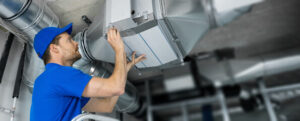HVAC Systems and How They Work
In the industrial era, HVAC systems were invented. A heat exchanger transfers thermal energy to the air. Heating and cooling panels or water-source heat pumps are central HVAC devices. The devices are combined in an air handling unit, which includes supply and return air fans, humidifiers, and cooling and preheat coils. Air is then returned through a mixing box. Some HVAC systems can also use outdoor air to cool the building. This article will explore the different types of HVAC systems and how each one works.

A career in HVAC equipment requires years of training and certifications. While homeowners can perform simple tasks such as changing a filter, HVAC technicians handle installations, repairs, and part replacements. The HVAC industry involves numerous special skills, including metalwork and carpentry. It is not for the faint of heart – even if you have a diploma in metalworking, you’ll still need to learn how to use special tools. The following are some important facts about HVAC equipment.
HVAC systems may contain ventilation systems, dehumidifiers, air purifiers, and humidity sensors. The systems are controlled by a thermostat. These thermostats can be conventional or smart and can trigger specific components when a preset temperature is met. Some thermostats are programmable, so they can notify the homeowner if a problem arises. Some even share diagnostic data with an HVAC contractor. The benefits of HVAC systems are well worth considering.
To become an HVAC technician, you must complete a vocational program. The HVAC program can help you land an entry-level position in just ten months. Some HVAC technicians choose to train through an apprenticeship program, which requires several more years. This type of training is also a good option if you are unable to find employment immediately after graduation. The time spent on training is a huge benefit, especially if you’re looking for a career in HVAC.
In case you’re concerned about the size of your HVAC unit, you can opt for ductless systems. While these HVAC systems will require you to make some minor renovations, they can be installed in a day. Split systems are another alternative and require very little maintenance. And as you can see, HVAC systems are an essential part of any home or office. And the benefits of these HVAC systems are plentiful. HVAC systems can help you keep your home comfortable, regardless of your budget.
As an HVAC technician, you’ll need to be physically fit to work with heavy equipment. You’ll have to climb ladders and crawl through tight spaces to reach difficult areas. You’ll also need a strong grip, good hand-eye coordination, and the ability to use hand tools. You will be working with electrical equipment and specialized hand tools, so you’ll need to be strong and flexible. You can also work remotely as an HVAC technician.
HVAC systems can be combined with window air conditioning units or combined with radiant heating. Another alternative is the use of a central heating and air conditioning system. Both systems use a single blower to circulate air throughout the home. The advantages of an HVAC system are that it can improve the indoor air quality in the home or office while providing comfort to everyone. HVAC systems are extremely important for residential buildings. In addition to improving the quality of air, HVAC systems can improve the efficiency of your building.
The amount of outdoor air that enters a classroom should be limited. Using basic engineering principles, these concerns can be easily addressed. There is no greater risk of mold growth in a building with a duct liner or a duct board. The benefits of variable occupancy HVAC systems go beyond energy savings. They also help control moisture and mold.
There are many types of HVAC systems. Most HVAC systems are classified into local, decentralized, and central systems. Central HVAC systems serve multiple rooms and zones, while local HVAC systems are intended for one zone. These systems should be designed based on the location of primary equipment and the system classification. This table summarizes the differences between these systems. HVAC systems have four main requirements. These requirements are:
Heating and cooling systems use a mixture of gas and liquid. Air conditioners absorb heat from inside a home and transfer it outside. A refrigerant (liquid or gas) in the cooling system can absorb heat when at a different pressure than the ambient air. By modulating the refrigerant’s pressure, the heat can be removed from the house. The heat is removed by a system’s temperature-regulating compressor. This process can take hours.
